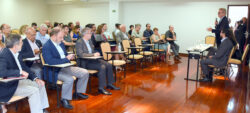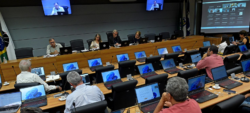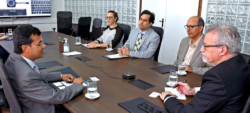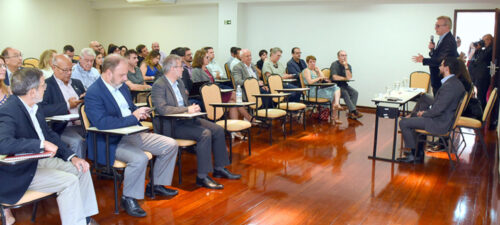After a period of contact hampered by the coronavirus pandemic, Unicamp began, now in March, a process of rapprochement with Portuguese universities and institutions. A delegation from Unicamp, led by the dean Antonio José de Almeida Meirelles, was in Lisbon, Porto and Coimbra between March 20th and 24th, for a series of meetings with deans, members of teaching and research institutions and representatives of related companies to research in the area of renewable energy.
The objective, as explained by the dean, was to resume or initiate collaboration projects between the institutions. The organization of the trip was carried out by Unicamp's International Relations Executive Board (Deri).
In addition to the dean, the Brazilian delegation included the chief of staff, professor Paulo Cesar Montagner, professor Angela Christina Lucas, advisor to the Pro-Rectory of Research, professor Alfredo César Barbosa de Melo, advisor to Deri, professor Renê Trentin Silveira , director of the Faculty of Education, professor Odilon José Roble, director of the Faculty of Physical Education, professor Flávio Henrique Baggio Aguiar, director of the Faculty of Dentistry of Piracicaba, professor Leonardo Lorenzo Bravo Roger, director of the Faculty of Technology, and Daniel Cantinelli Sevillano, also from Deri.
In Lisbon, the group was in contact with representatives of the Portuguese Language Countries Commission (CPLP) – an institution that brings together members from all Portuguese-speaking countries in the world and which works as an entity to foster collaboration between these countries.
According to the dean, the meeting discussed forms of cooperation with cultural, university and science and technology entities in Portuguese-speaking countries. The group was then received by the Brazilian ambassador in Portugal, Raimundo Carneiro, and, in Lisbon, they visited the Calouste Gulbenkian Foundation – which houses the private collection of the philanthropist of Armenian origin who lived in Lisbon and who, in 1956, ended up creating the foundation by will.
The institution has a Modern Art Center that brings together the most important collection of modern and contemporary Portuguese art, an orchestra, a choir, an art library and archive, a scientific research institute and a garden, which is a central space of the city of Lisbon, where educational activities also take place.
The delegation also met with representatives of the research area of the company EDP (Energias de Portugal). The company – which has investments in Brazil – operates in the wind and photovoltaic energy sector. The group from Campinas presented the HIDS (International HUB for Sustainable Development) proposal to the company's executives.
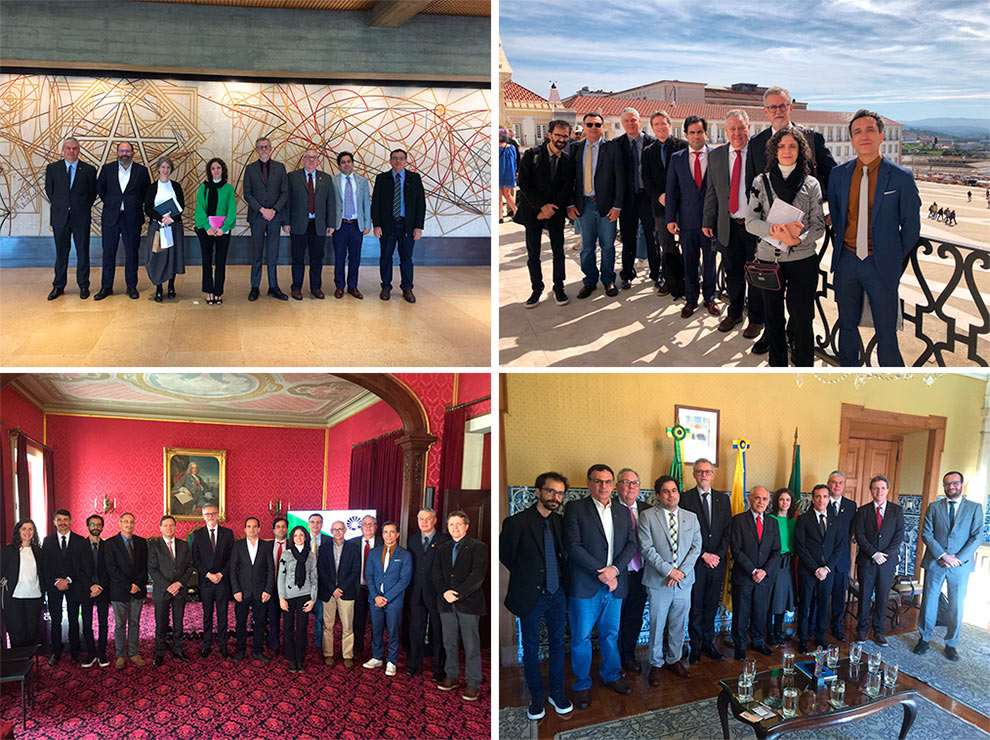
University of Coimbra
The Unicamp group was at the University of Coimbra – where they were welcomed by the vice-rector for External Relations and Alumni, professor João Nuno Calvo e Silva, and by the vice-rector of Open Science, Delfim Leão. According to information from the university, around 3 Brazilian students take undergraduate and graduate courses in Coimbra.
“We have many collaboration actions in some areas, whether in undergraduate and postgraduate courses, or in research”, said Unicamp's dean. “We also presented a lecture on the challenges of science and technology in Brazil and in the State of São Paulo”, he said. Additionally, directors of teaching and research units also met with their correspondents at the University of Coimbra.
Sports and humanities area
Meirelles says that the group was also at the University of Porto, with which Unicamp maintains very strong collaborations in the area of sports and in other areas of science and humanities. “These conversations were, first, with the rector António de Sousa Pereira, then with the technology and innovation area of the university, UPTech (Universidade do Porto Tecnologia), which represents the Portuguese correspondent to what would be Inova Unicamp”, explains Meirelles .
There were also meetings with directors of several units. Each director held separate meetings with the directors of the corresponding local units, with the aim of expanding existing agreements or starting new partnerships. According to Meirelles, representatives from the University of Porto will visit Brazil in the second half of this year. “Our objective is to expand what we have in terms of collaborative actions and make this penetrate more deeply into the structure of the two universities, involving areas that do not yet have agreements”, he says.
continuous work
The dean guarantees that this approximation work will continue with teaching, research, extension and innovation institutions in other countries. He recalled that recently a group from Unicamp was in contact with universities in Germany and, later, in the United Kingdom.
“It is a systematic quest to restore relationships that were somewhat damaged by the pandemic, but to restore them to a new standard, with a view to our strategic planning and what the opportunities in Brazil today – mainly related to sustainability issues – offer. And we will continue”, says Meirelles. According to him, visits to teaching institutions in Canada and the United States are planned for this year.
“Our goal is to strengthen these relationships and, in the longer term, aim for a better symmetry of relationships. Brazil, traditionally – and Unicamp in particular – sends more people out than it receives. We want to reduce the asymmetry of this movement. We want to bring more researchers and students from abroad and also exchange servers, so that we can improve our administrative processes”, she says.
“We think this is possible to do. We have challenges to face, but we also have good assets, so to speak. Unicamp is an internationally recognized university and Brazil, in turn, has the attraction of being one of the countries where the issue of environmental sustainability and social inclusion is at the top of the university agenda. This attracts the attention of the world and universities around the world”, believes Meirelles.
Politics
The dean's trip to Portugal reflects the international relations policy established by the management and carried out by Deri, says Alfredo de Melo. “We are a university that maintains a fruitful dialogue with other major universities, such as the University of Coimbra and the University of Porto, with which we maintain very high-level academic cooperation. But beyond academic ties, Unicamp has been able to insert itself into an increasingly complex political-scientific ecosystem, talking to companies, the third sector and government agents to coordinate our international actions”, he adds.
“The mission showed that Unicamp is ready to insert itself in a challenging world that demands from the University an ever-increasing versatility to interact with a society that is undergoing rapid social and technological changes”, concludes the professor.
Originally published on Unicamp website
